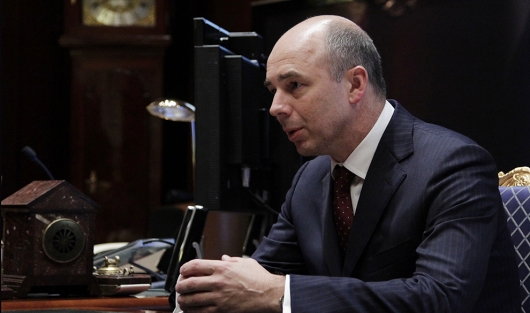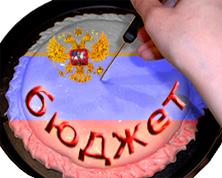Fiscal revolution: how falling incomes will force the power to make a choice

Photo by Mikhail Klimentyev / RIA Novosti
The 2014-2015 budget was still able to maintain “stability”, but now their durability is almost exhausted
This continuation of the series of publications of the Russian experts from the Association of independent centers of economic analysis (ARETT) on strategic development issues of the country.
This year, at any event (except for a sharp rise in oil prices), the Russian economy will experience a recession. Our baseline forecast assumes a GDP decline of 1.7%, reduction of retail trade turnover by 5.4%, approximately the same reduction in wages, a decline in investments of 5.9% and a further decline of imports, and sluggish export dynamics. The anti-crisis plan of the government is focused on short-measures, but to avoid recession this year, it will not help. But if deeper reforms, as usual, will remain a mere Declaration of intent, the recession may last even several years.
Meanwhile, the budget drama only escalates, as the costs bad “compressed” under a reduced volume of oil and gas rents.
At $40 the picture is even tolerable. A shortfall in revenues of about a trillion rubles. In the budget for 2016 in spite of the deficit of 2.36 billion. rubles in the Reserve Fund at the beginning of 2016 remained around 3.6 trillion. rubles. When approved by the sequestration of spending by 0.5 trillion. rubles and execution of the program of borrowings to the end of the year in the Reserve Fund is still about a trillion rubles, and then will be able to use the Fund of national property (about 4 trillion. RUB, if you count liquid assets, while not connected by any obligations) will suffice for 2017 and some 2018. There is a possibility for some time to pull decision-making.
However, the scenario of life at $25 per barrel (as it already applied to the Ministry of economic development and the Central Bank ) is radically different. It really is a shock option for the budget and for the economy. Falling incomes reach 3 trillion. RUB This huge volume is that the dependence oil and gas revenues from oil prices is of a progressive nature — such is the scale of export duties. In this case, the Reserve Fund will end in 2016, SWF 2017. No further resources will not…
The essence of the fork, which will go to the government ($40 later for $25 before), in determining the future of the share and structure of the public sector in the economy, and what determines a way of balancing the budget.
The first one is more radically cut costs.
Under the current us management models the reduction of the budget pie leads to the fact that large and powerful lobbyists crowd out weaker, despite all rational arguments about the comparative effectiveness of different types of costs. We see, for example, discussion around ways to support VEB. Even the most determined people in the Finance Ministry who say that you can waive many of the costs, recognize that there “will inevitably have to help.” Just looking for the least painful, from the point of view of state obligations, the way. Given the current power of lobbyists and corporations in the defense sector, as well as appetites affiliated with the current ruling elite contractors, “optimization” affects them the least. While the state has a stock of loyalty on the part of the population, which allows us to cut the social programs, but you should understand that lowering the quantity and quality of public services in the future is fraught with degradation of the educational and cultural level of the people, increasing morbidity and mortality, and balancing of the pension system without reform, simply due to the gradual impairment of pension liabilities — a rollback to the times of mass poverty.
On the other hand, if the amount of expenditure obligations of the budget system relative to GDP will not decrease over the coming years by 3-4 percentage points (where the nominal abbreviations somewhere at the expense of refusal from indexation), long-term balance is achieved only by raising taxes. Pending the examination of individual proposals, such as introducing excise taxes on “harmful products” or increase excise taxes on alcohol, but here we are talking about small amounts.
Significant funds would help mobilize new tax increases on the oil and gas industry.
Even with the decline in oil prices, commodity businesses do better than others – and the investments they fell and with the salary all is well. So the money they can get — for example, change the formula of calculation of export duties or to withdraw a portion of the proceeds from the devaluation. Though if to remember that in the future we want to leave from dependence on natural resources, to balance the budget by raising oil taxes would be short-sighted.
Another possible source of additional tax revenues and social payments.
The easiest option is the establishment for all salary levels flat scale of payments to the Pension Fund. Pension as a result finally lose the insurance nature and will not depend on the wage of the future pensioner, but only from revenues. More complex solutions – increase income tax, which remains in Russia one of the lowest quasianalogue or the introduction of co-payments of the population for public services.
Unfortunately, almost any initiative in the tax area other things being equal will lead to further suppression of economic activity and the deepening recession. If the majority of taxpayers will fade into the background, there is a risk to not get the expected increase effective tax rates and revenues.
Privatization of shares in state owned companies – the case of overdue, but the devil is in the details. Projected for this year amount to 900 billion rubles – absolutely fantastic, given that in previous years it was possible to rescue only a few billion.
Ideally, you want to sell everything, including Rosneft and major state-owned banks, and to allow for transactions of foreigners.
However, everything can be reduced to the use of credit and offshore schemes while retaining control in the current management. Better, in this case, if the Ministry of Finance just would have taken the missing rubles on the domestic market.
Privatization at the expense of means NPF has the same weaknesses. From the point of view of the interests of future retirees, it is better to invest in conventional OFZ bonds than in stocks, losing the capitalization due to poor management.
The Ministry will be able to come up with new borrowing on the market, although high rates will generate expenditure commitments for the next years. While current budget expenditures will be financed with internal investment resources (which are scarce). In the short term, such a policy might work, because now banks and companies are really a lot of liquidity, which will not be embedded due to poor business climate. It is clear that this year the funds would not go into investments, but if they will be invested in government securities, it will not work in the coming years.
As the exhaustion of reserves quite real-is another alternative: we don’t want to reduce costs, but instead of raising taxes run in more or less veiled form printing press. Aside from the obvious inflationary consequences (according to our estimates, inflation in this case will be a double-digit, devaluing as current income and savings), the problem of emission pumping of the economy is the inefficient allocation of financial resources thrown in.
Money wouldn’t be scattered from a helicopter.
Help go “promising sectors”, i.e., all of the same powerful lobbyists who are able to master any funds in record time. Needless to say, the structure of the economy can only get worse. Now the amount of the emission of conventional limited by the amount of the Reserve Fund – currency transferred by the Central Bank, which prints rubles to cover the budget deficit, while the Central Bank can sterilize the liquidity, reducing credit previously issued by the banking system. When the amount of the emission will become a matter of bargaining or “political expediency”, no landmarks and therefore the credibility of macroeconomic policy remains. Seems strange, when the idea of monetary financing of support for small business, naively believing that they are something will get. Would benefit associated with the state structures, others will continue to lose due to rising prices and depreciation of the ruble. Given the high risks of capital flight, this policy almost certainly will be accompanied by the restriction of foreign exchange transactions.
Thus will be laid a few bricks in the wall that separates Russia from other countries.
If in 2014-2015 opportunities of macroeconomic and particularly fiscal policy was still able to maintain “stability” in line with the decline of export revenue, sanctions and counter-sanctions, but now their durability is almost exhausted. Tough choice between the vital interests of the wider community and private business. If the largest state corporations, the defense lobby and affiliated with the state contractors will not be ready to give up their positions, the inclusion of the printing press will enable them to gain time, but will destroy the economy completely







